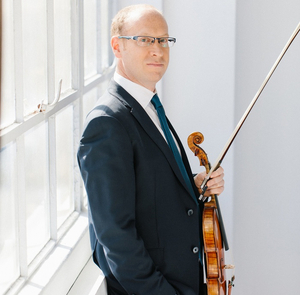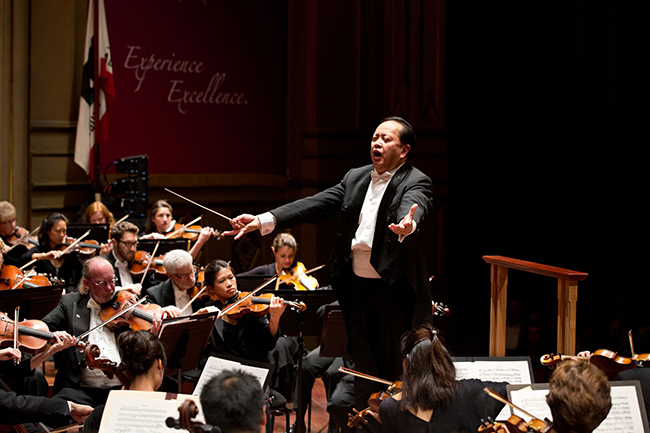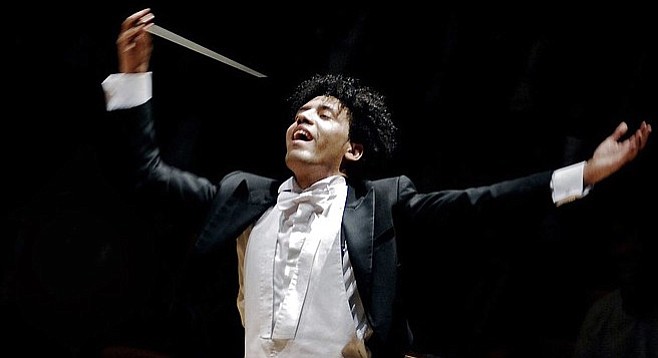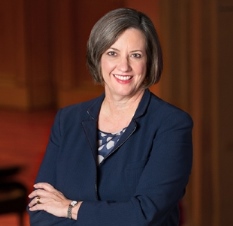Interview: SAN DIEGO SYMPHONY Concertmaster Jeff Thayer at The Conrad In La Jolla
The concertmaster graduated from the Cleveland Institute of Music.

Jeff Thayer was at the Dorland Mountain Arts Colony in Temecula when we spoke for an hour on Zoom. "I'm usually here right before I have something big to do." He was referring to upcoming performances of the ninth violin concerto of The Chevalier de St. George at The Conrad in La Jolla.
As the San Diego Symphony's Concertmaster, Thayer has realized an ambition dating back to high school. To further his ambition, he went on to graduate from the Cleveland Institute of Music, the Eastman School of Music and the Juilliard School's Pre-College Division.
Thayer came to San Diego from the Atlanta Symphony where he'd been assistant concertmaster for two years. Music Director Jahja Ling was guiding the San Diego Symphony's recovery from bankruptcy when Thayer learned he was after a new concertmaster. "I believe I was one of about 10 principles hired the same year, and it was right after the big fire of 2003. In fact, the little artist's colony where I am right now burned to the ground. I remember that pretty

vividly, that fire, but I didn't move here until the fall of 2004. They have slowly rebuilt and it's now a really wonderful place for me to come."
As is often the case with successful musicians, Thayer grew up in a musical household. "My mother was trained primarily as an oboist. I remember her making reeds when I was little, but her minor through college and graduate school was violin. She became the violin teacher in my hometown of Williamsport, Pennsylvania, and a lot of that had to do with my older brother who first started with her, and then I followed in his footsteps. My dad was a professor at Lycoming College. He taught composition and theory, composed and was a choir director.
Thayer's brother went on to become a violinist with the New World Symphony in Miami Beach. After four years, there he switched to management, specializing in community outreach in Miami and St Louis. "And then he worked for the State Department for a while to bring music education, mostly to war-torn countries in Africa, Asia and the Middle East."
Both brothers have travelled extensively here and abroad. "Yes, and I thank my parents for that. They moved us to Spain twice when I was growing up, and we were in the public schools there. It opens your eyes to a lot and is probably the best thing my parents ever did for my brother and me."
While in Spain, he first began to believe he could succeed as a musician. "I was a freshman in high school and didn't have a lot of friends or social life. So I had a lot of time to practice. While in the local conservatory I was given an opportunity to solo with the orchestra. It lit a fire under me. I realized I liked it a lot and, with the improvement I made that year I thought, well, maybe I have a chance of doing this and then really got to work."
But it did mean less soccer. "Yes, but I still play soccer on Sunday mornings. it's a very small private game at a gentleman's house in Rancho Santa Fe. I've been going there since my first year in San Diego, so it's a really wonderful two hours of my week." Hiking is another outdoor activity. "I can't get enough of it. I love Cuyamaca and a trail near Julian."
As a musician and teacher, Thayer hears a difference between the violinists he admired when he was growing up and today's virtuosi. "Individuality, there is less and less individuality. One of the recordings that really got me excited to play something way beyond my ability was Pincus Zuckerman's. I look up to and admire all of the great older generation of violinists. My teachers--Eastman's V. Zeitlin, Bill Preucil, former concertmaster of the Cleveland Orchestra and Donald Weilerstein, Raphael Payare's father-in-law. I believe the recording industry greatly affected how and what violinists learn and how they use their creative minds. The industry has created this desire to be perfect. You don't hear mistakes generally, because you can record over and over again until every passage is perfect. On the other hand, it has also raised the technical level and ability of the younger generation. The number and quality of orchestras has tremendously improved from 50 years ago. it's like the internet, you get the good with the bad."
Since classical music isn't as popular as it was 50 years ago, I asked why are so many training for a career with fewer opportunities? "I've always been concerned with how many music
schools there are. There's this tricky balance of encouraging and inspiring young musicians while being realistic. I encourage to a point. But if I see a limitation, I'm direct about expressing that because it's so difficult to have a successful performing career. I just had a 13 or 14-year old young woman who was just a spitfire, and she moved to Ann Arbor, Michigan. Fortunately, there is a quite good music school in Ann Arbor. I was sorry she moved, but I was able to pass her on to a good teacher at the university. I wouldn't have done that had I not believed in her. Of course, there's not just the orchestra world. My brother, for example, was a fantastic violinist but eventually found a calling in a different part of the music industry."
As a teacher, Thayer believes in more than technique. He urges students to learn the context in which a piece was written. To show why, he cited the Britten violin concerto, coincidently written when the composer was visiting near Temecula. "I was the soloist with the orchestra before the pandemic hit, and I love the piece. It was written during the Spanish Civil War. You can hear heartache in it. As you're learning it, it leads you down emotional roadways you might not travel if you aren't aware of the context. It was also premiered by a Spanish violinist. There's a lot of Spanish flair, even though Britten was English. How could that not affect the way you look at a piece?"
Listening to the musicians you're performing with is another aspect of coaching he feels should receive more emphasis. "Nobody taught that in school or in grad school. A conductor is necessary for a full symphonic orchestra, but I think that you can wind up watching, but not necessarily listening." He says the listening required in the Camera Lucida chamber-music ensemble he cofounded benefits his play in larger ensembles.
As a concertmaster Thayer sometimes appears as a soloist. Once when Hillary Hahn was unable to perform, he substituted in the Bruck Scottish Fantasy with just four hours of notice. More often, it's a scheduled appearance. "I have tried very hard since I've been in San Diego to pick pieces I had never before performed or learned. There's an endless list of violin concerti, and I'll never get through them all. But I've tried my hardest to keep on that path."
He said he'd never even heard the Britten concerto before his wife Marlyse suggested it. She's also a violinist and fills in with the San Diego Symphony. "After hearing me play the Bartok second concerto, she thought that I would do a good job with the Britten. I ordered the music, and it was on the schedule. I remember reading through it the first day and thinking, oh boy, I'm in trouble. I would venture to say that it's at least as difficult as the Bartok. But I I fell absolutely in love with it. The most gripping part of the piece is the end. It is so painful. By the time I performed the concerto I had it memorized, which was a bit of a stretch, but I managed to do it. I always feel better about performing when I have a piece memorized."
The Beethoven concerto is one he's yet to play while concertmaster. "I hope before I retire I can play the Beethoven. It's a hard one for the concertmaster to get, but I am going to ask for it someday."
If Thayer performs the Beethoven with the San Diego Symphony, it will be on the 1708 "Bagshawe" Stradivarius donated to the Symphony by Joan and Irwin Jacobs. I wasn't at all surprised it was nearby enough that he need reach just a little to his left to bring it into the picture when we began talking about it . He speaks of the instrument as though it were alive. "You really need to know what touch it needs. Practically every note requires a slightly different touch, and it changes with dynamics. It's not easy to play, but the challenge is worth it because of the reward. It took me a couple years to begin to feel like I knew what the instrument needed, and it's a real relationship. There are a lot of more powerful modern instruments. But I think there's a brightness and purity to the tone which helps the sound travel to fill a hall."
Still relatively young, Thayer has had an enormous range of experience as concertmaster, soloist and teacher, but no conducting ambitions. "None whatsoever. There are enough bad conductors in the world."

And he couldn't be happier with his current one, Rafael Payare.
"There was an immediate musical compatibility with Raphael. We did a Berlioz overture, and right away, we were playing like a better orchestra. It begins with the fundamentals of good conducting technique. He is one of the clearest conductors I have ever experienced on the podium, and he has endless energy.
"Twenty years ago the orchestra was dead. And for an orchestra to have a sense of tradition, a
style, it takes a lot of time. So I think we are still a budding orchestra. Every year I've been here, I've felt a noticeable improvement that continues to this day. We owe Yahja Ling a lot for bringing in good players and making consistent progress. I believe Raphael will continue to take us where we want to go, and he is here because of Martha Gilmer (CEO). There is much excitement and momentum. If you'd asked me when I came here about a new hall and outdoor amphitheater, I'd have thought you were crazy. A board member said she's getting this stuff done because she doesn't know she can't."
On the home front, the Thayer family is still adjusting to the addition of two new members. "I'm

realizing how kids make a difference. I want to be there as much as I can for my family. It's a balancing act. Perhaps it's a mixed blessing that Marlyse is not a fulltime orchestra member, but it's wonderful that she can play when it's possible. We're learning as we go. Our daughter just started preschool. That's an adjustment. Our son recently began sleeping better, so that's an improvement. I told a friend that things are going well, with a small amount of chaos thrown in."
Visit the San Diego Symphony website for a list of this season's coming concerts.
Uncredited photos compliments of the San Diego Symphony.
Comments
.png)
|
.png)
|
Videos

